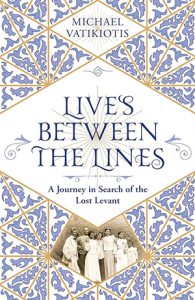Lives between the Lines: A Journey in Search of the Lost Levant

Author: Michael Vatikiotis
Publisher: Weidenfeld & Nicolson
Year of Publication: 2022
Print Length: 304 pages
Genre: Non-Fiction / Travel Writing, Autobiography or Memoir
Area: The Levant, Ottoman Empire, Mediterranean, Middle East
People: Christian, Jews, Muslim, The Arabs
Topic: Christianity, Islam, Judaism, Religion, Conflict, History, Identity, Culture & Society, Cultural Heritage/Legacy, Civilization, Race, Violence & Mass Violence, Exile & Exodus
The story begins with a parting of the sands – the construction of the Suez Canal that united the Mediterranean with the Arabian Sea. It opened the door of opportunity for people living insecurely on the fringes of a turbulent Europe.
The Middle East is understood today through the lens of unending conflict and violence. Lost in the litany of perpetual strife and struggle are the layers of culture and civilisation that accumulated over centuries, and which give the region its cosmopolitan identity. It was once a region known poetically as the Levant – a reference to the East, where the sun rose. Amid the bewildering mix of races, religions and rivalries, was above all an affinity with the three monotheistic religions: Judaism, Christianity and Islam.
Today any mixing of this trinity of faiths is regarded as a recipe for hatred and prejudice. Yet it was not always this way. There was a time, in the last century, when Arabs and Jews rubbed shoulders in bazaars and teashops, worked and played together, intermarried and shared family histories. Michael Vatikiotis’s parents and grandparents were a product of this forgotten pluralist tradition, which spanned almost a century from the mid-1800s to the end of the Second World War in 1945. The Ottoman empire, in a last gasp of reformist energy before it collapsed in the 1920s, granted people of many creeds and origins generous spaces to nestle into and thrive. The European colonial order that followed was to reveal deep divisions. Vatikiotis’s family eventually found themselves caught between clashing faiths and contested identity. Their story is of people set adrift, who built new lives and prospered in holy lands, only to be caught up in conflict and tossed on the waves of a violent history.
Lives Between the Lines brilliantly recreates a world where the Middle East was a place to go to, not flee from, and the subsequent start of a prolonged nightmare of suffering from which the region has yet to recover.
Table of Contents
List of Illustrations
Maps
Family Trees
Timeline
PART I: PIONEERS
Prelude: ‘Alla Franga‘: The Ottoman Pocket Watch
1. Piercing the Sands
2. Grand Hotel de la Poste
3. The Khedive’s Gold
4. Blue Bricks by the Nile
5. Baba Yannis Settles in Acre
6. Brother Maximos in a Cave
PART II: THE RUPTURE
7. Philby’s Batman
8. Among Arabs and Jews
9. Rommel at the Gates
10. End of Days in Palestine
11. Dispersal and Desolation
12. The Suez Syndrome
Epilogue
Notes
Acknowledgements
Index

Michael Vatikiotis has been a writer, broadcaster and journalist in Asia for more than 35 years. With family origins in the Middle East, he has lived in Egypt, Indonesia, Malaysia and Thailand as well as Hong Kong. He has written three books on Asian politics: “Indonesian Politics Under Suharto” and “Political Change in Southeast Asia.” Most recently (2017): “Blood and Silk: Power and Conflict in Modern Southeast Asia”. His published fiction includes two novels set in Indonesia, “The Spice Garden” (2006) and “The Painter of Lost Souls” (2012). His latest book is “Lives Between the Lines: A Journey in Search of the Lost Levant” published by Weidenfeld and Nicolson in in 2021. Vatikiotis currently lives in Singapore working for the Centre for Humanitarian Dialogue, a Geneva-based private foundation that facilitates dialogue to resolve armed conflicts, and is a regular broadcaster and contributor to the opinion page of several newspapers. Vatikiotis is a graduate of the School of Oriental and African Studies (SOAS) in London, earned his doctorate, which was on Thailand, from Oxford University, and was awarded an honorary doctorate from the University of Maryland. He is a member of the Asia Society’s International Council and speaks the Thai and Indonesian languages fluently.
Source: https://www.mvatikiotis.com/?page_id=2
More from Michael Vatikiotis in this library, click here.
